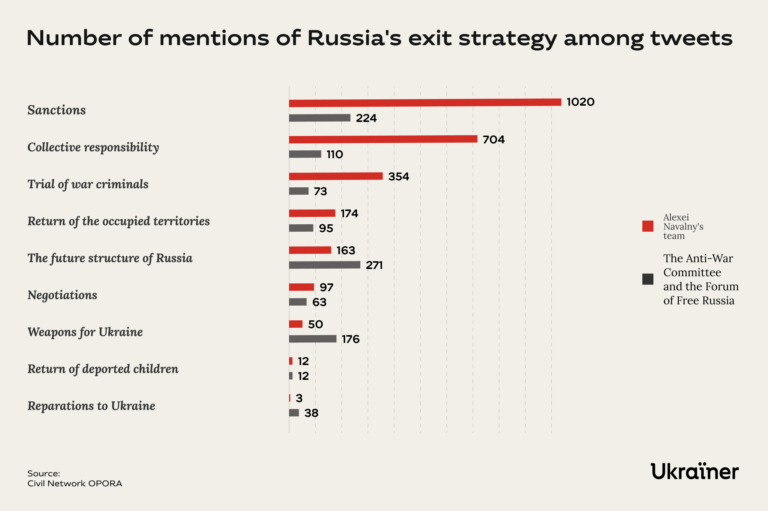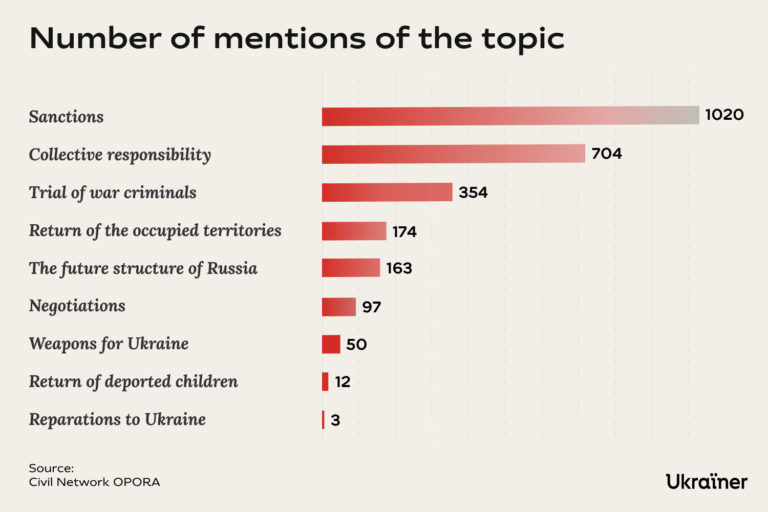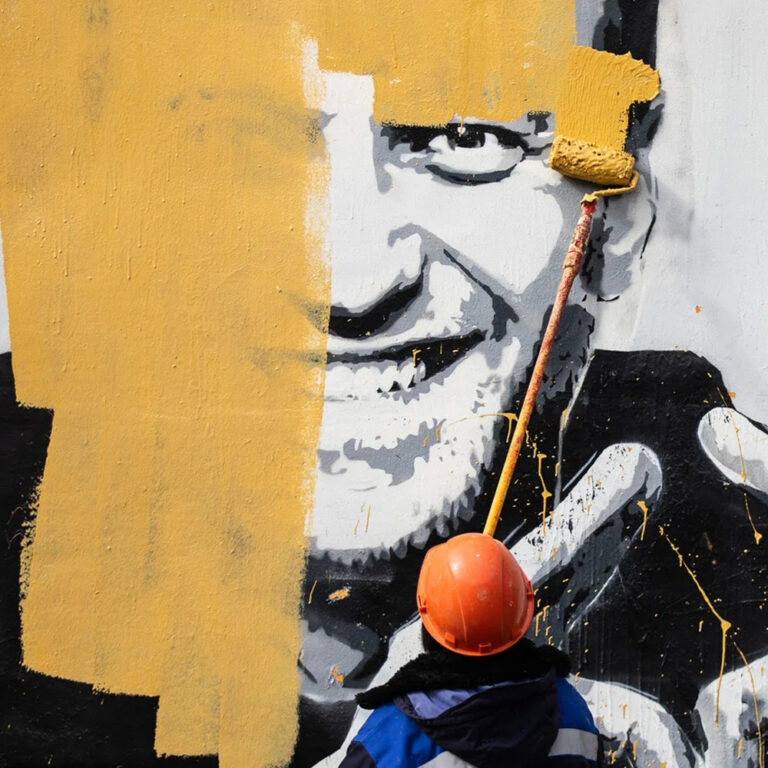
How oppositional is Alexei Navalny’s team? Calling themselves the opposition, this Russian group talks about fundamental democratic beliefs and the end of Russia’s war against Ukraine. But a closer look at their statements shows that this is far from their main focus.
This is why the Civil Network OPORA team decided to conduct a thorough study of the media activity of Russians who claim to be in opposition to the current Russian government. This research aims to discover who the Russian “opposition” really is, whether its public position is really aimed at establishing justice, and what challenges the world will face if it comes to power. This article focuses on Russia’s most prominent “opposition” leader, Alexei Navalny, and his team.
Editor's note
The authors of the research analysed the Twitter accounts of Russian "oppositionists" but deliberately did not give links to their original posts to avoid promoting their profiles.Why is it important to analyse the Navalny team’s views on ending the war?
The cessation of hostilities and the withdrawal of Russian troops from Ukraine’s internationally recognised borders are not enough to achieve security and stability. Russia’s recent history of military aggression in Moldova, Syria, Ukraine, Georgia, the Central African Republic, and Mali, as well as its support for authoritarian regimes, shows that without accountability for crimes, justice for war criminals, compensation for damages, structural reform, and the de-imperialisation of Russia, we are not solving the problem, but only delaying the next chapter of Russian aggression.
True victory for Ukraine in this war must come not only on the frontline but also through changes inside Russia. This is the only way to guarantee a sustainable peace. In addition to the constant threat today’s Russia poses to other countries, the full-scale invasion has shown European countries the internal social and economic consequences of a war near their borders. Ukraine and its partners are already developing a list of steps Russia must take to regain trust as a safe and reliable partner in the international arena.
It is widely believed that the Russian “opposition” and the Ukrainian people have a common enemy — the Russian dictatorship. Some say that fighting against the Putin regime and for peace in Ukraine is the same struggle. But whichever government leads post-war Russia will be obligated to compensate and take responsibility for Russia’s crimes, victims, and destruction. Anyone with political ambitions in post-Putin Russia will have to face the burden of socio-economic recovery after a disastrous war, reforming Russia, enduring sanctions, and paying for damages to Ukraine. This is the front line of a clash between the needs and interests of Ukraine and of the Russian opposition.
At present, the Russian “opposition” is already building its profile and political resources, particularly among Russians living abroad. One of its priorities is to lobby internationally for the interests of Russians rather than for the needs of Ukraine, which is defending itself against the very dictatorial Russia that the “opposition” is fighting against. Secondly, the Russian “opposition” also needs financial and informational support from international partners to continue its public and political activities. Thus, they are competing with Ukraine for narrative, material, and non-material resources and for present and future agendas regarding the obligations of post-Putin Russia.
Currently, the Russian “opposition” is not a victim of the dictatorial regime, but a potential force that could take steps towards restoring justice for Ukraine and achieving lasting peace. However, whether this is currently part of their political agenda is an open question. We decided to conduct this study to find the answer.
The Navalny team before and after Russia’s full-scale invasion of Ukraine
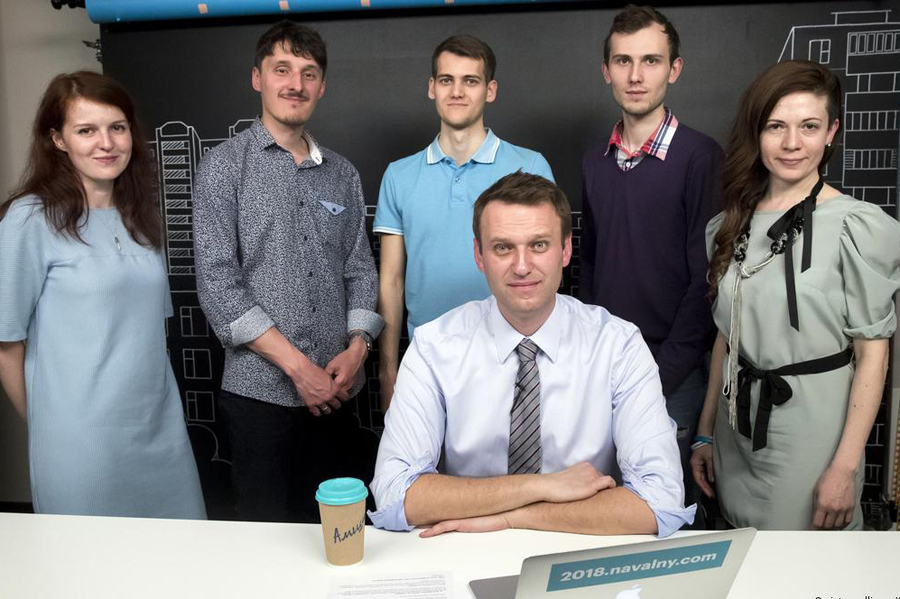
Navalny's team. Photo: picture-alliance, AP Photo.
The Navalny team is made up of associates of Russian politician Alexei Navalny. It was formed in 2011 after Navalny founded the Anti-Corruption Foundation (ACF). The AFC’s main goal is to expose corruption among Russian authorities and conduct investigative journalism and anti-corruption education.
Navalny began his public and political activity in 2004 when he founded the Committee for the Protection of Moscow Citizens, which focused on anti-corruption and human rights activities in Moscow’s urban planning. Later, his civil engagement, human rights, and anti-corruption work merged and became fully institutionalised with the establishment of the ACF. In 2013, he ran in the Moscow mayoral election and came in second after current mayor Sergey Sobyanin.
Russia’s occupation of Crimea through Alexei Navalny’s eyes
People in Ukraine still remember Navalny’s role in the Crimea debate and his statement in a 2014 interview on the Russian radio station Echo of Moscow. In response to a direct question from Russian interviewer Alexei Venediktov — “Is Crimea Russian?” — Navalny replied that the peninsula belongs to the people who live there. The politician stated that although “Crimea was annexed with flagrant violations of all international norms,” it is, in fact, Russian. He advised Ukrainians to come to terms with the idea that “Crimea will remain a part of Russia and will not become Ukrainian again in the foreseeable future.”
In response to whether he would return Crimea to Ukraine if he became President of Russia, Navalny replied with his infamous words: “Is Crimea like a sandwich with sausage that you can just pass back and forth?” This “opposition” figure didn’t say anything unequivocal about the peninsula being Ukrainian. These words continue to damage the reputations of Navalny’s associates, who are forced to address them from time to time.
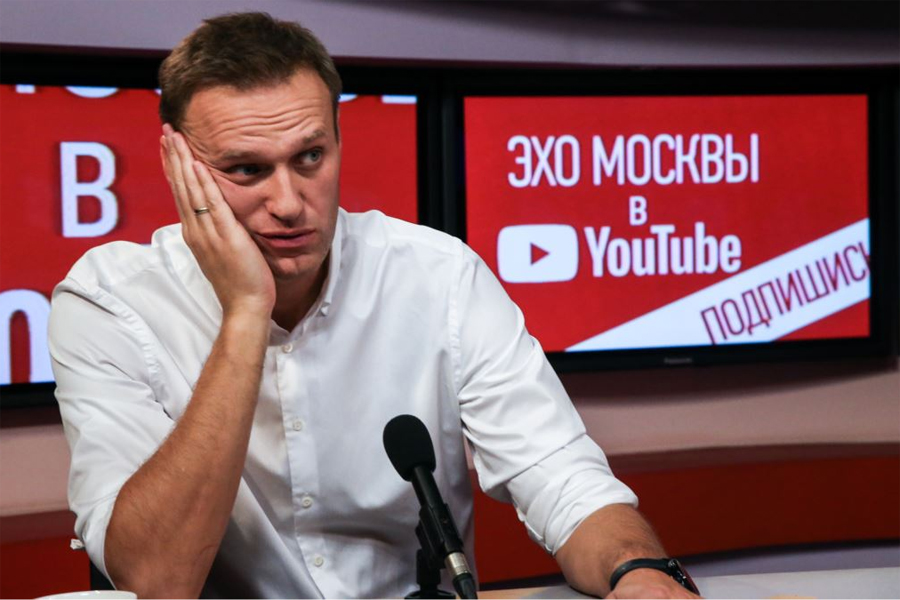
Navalny during his appearance on Echo of Moscow radio, screenshot from the video.
One of Navalny’s associates, Leonid Volkov, tried to defend his leader and advised people to refer to the “primary source”: Navalny’s alleged first statement about the occupation of Crimea, published in March 2014 on his LiveJournal blog (a popular blogging platform in Russia). Volkov accused “Twitter critics” of being too lazy to read the primary source before taking quotes out of context.
The authors of this study reviewed this publication and found many other questionable statements by Navalny. Before even getting to the topic of Crimea, the so-called opposition leader calls Ukrainians “khokhols” (an insulting imperialist term used by Russians for Ukrainians) and devotes an entire paragraph to the fact that Ukrainians, Belarusians, and Russians are “brothers in different apartments, not just neighbours” and that “brotherly” relations with Ukraine and Belarus are “Russia’s strategic advantage in this world.” He said this after Russian troops invaded Ukraine in 2014, so it is unclear what kind of brotherhood he was talking about. And in 2022, Ukrainians once again felt this brotherhood — in Bucha, Mariupol, Izium, and other settlements.

Screenshot from Navalny's material on LiveJournal for 2014
Further on in the blog article, Navalny asks rhetorically, “is it fair that Crimea belongs to Ukraine?” and answers, “Well, of course not. The fact that Crimea ‘ended up’ with Ukraine is wrong, unjust, and insulting to any normal resident of the Russian Federation. Crimea was transferred by the illegal voluntarist decision of the self-willed [Nikita] Khrushchev. The responsibility lies with the Communist Party of the Soviet Union and all those foolish Politburos, which would be good to remind the communists of in case they suddenly become so militant. The necessity to pay ‘rent’ for the Black Sea Fleet base is extremely irritating. Crimea is beautiful and picturesque. My wife and I spent our first holiday there together.”
This statement echoes a propaganda-myth promoted by both the Soviet government and modern Russia to justify their occupation of Crimea. You don’t need to be a historian, let alone a Russian presidential candidate, to learn the history of the Crimean Peninsula. It has never belonged to Russia: Crimea was occupied by the Russian Empire and later by the USSR. During the Bolshevik takeover of the peninsula in the early 20th century, Crimean residents resisted and declared their independence, which led to the execution of about 600 Crimean Tatars, Indigenous people of Crimea. In 1944, the Soviet regime deported nearly 200,000 Crimean Tatars from their homeland, replacing them with Russians and other ethnic groups. Navalny either didn’t know about all of this or chose to ignore it.
In his article Alexei Navalny parrots Kremlin-aligned propaganda. It’s just presented in more sophisticated, pseudo-intellectual packaging.
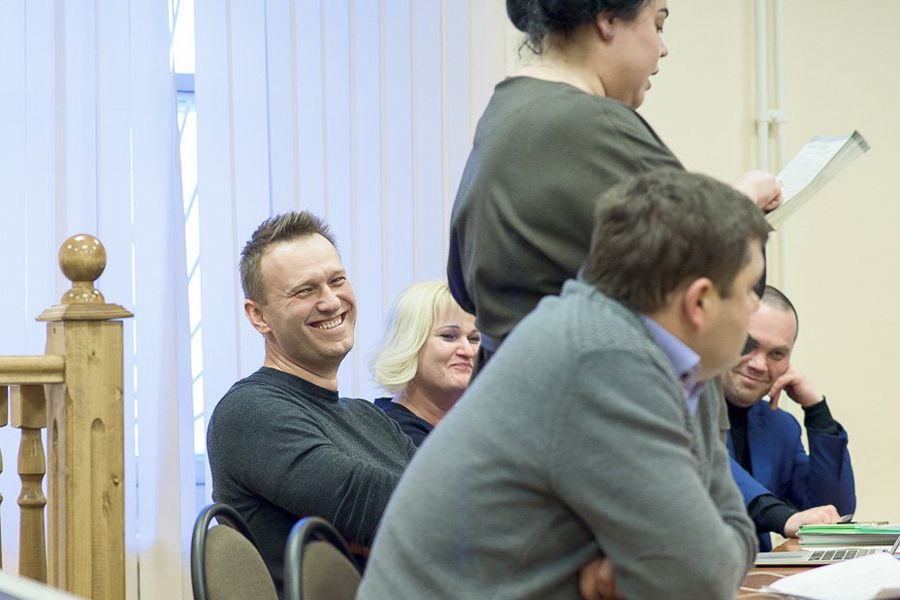
In a later passage, Navalny states that he condemned the occupation of Crimea because it violated international law and internationally recognised agreements, including those endorsed by Russia. He also didn’t consider the pseudo-referendum Putin used as a pretext for occupying the peninsula to be a true reflection of public opinion.
Navalny’s answers create a certain cognitive dissonance:
– Crimea is not Ukrainian.
– It is Russian.
– The only problem here is a violation of internationally recognised borders (not the imprisonment and torture of Ukrainians and Crimean Tatars who resisted the occupiers).
If the world didn’t regulate countries’ borders, would the occupation be justified? Would the destruction of the Indigenous population be okay?
At the beginning of 2023, the “Crimean issue” also put Maria Pevchikh, a member of Navalny’s team, under scrutiny. In an interview with The Guardian, Maria refused to comment on Navalny’s statements about Crimea, saying that it was not relevant to the topic at hand (the struggle to free Navalny). What prevented Maria from giving a short and unambiguous answer — “Crimea is Ukrainian” — and then returning to the topic of Navalny’s imprisonment remains a mystery.
Navalny’s team has also periodically posted maps of Ukraine without Crimea on Twitter and YouTube, legitimising Russia’s occupation of the peninsula. For example, in his regular column on Navalny LIVE, Vladimir Milov used a map of Ukraine without Crimea when discussing Ukrainian nuclear power plants. He tried to defend himself against criticism by explaining that it was a “schema,” not a map, and therefore not geographically accurate. Ukrainians also recall Navalny’s team using a map that showed Crimea as part of Russia in his 2017 presidential campaign, as if doing so was a requirement of Russian law that Navalny’s supporters could not ignore.
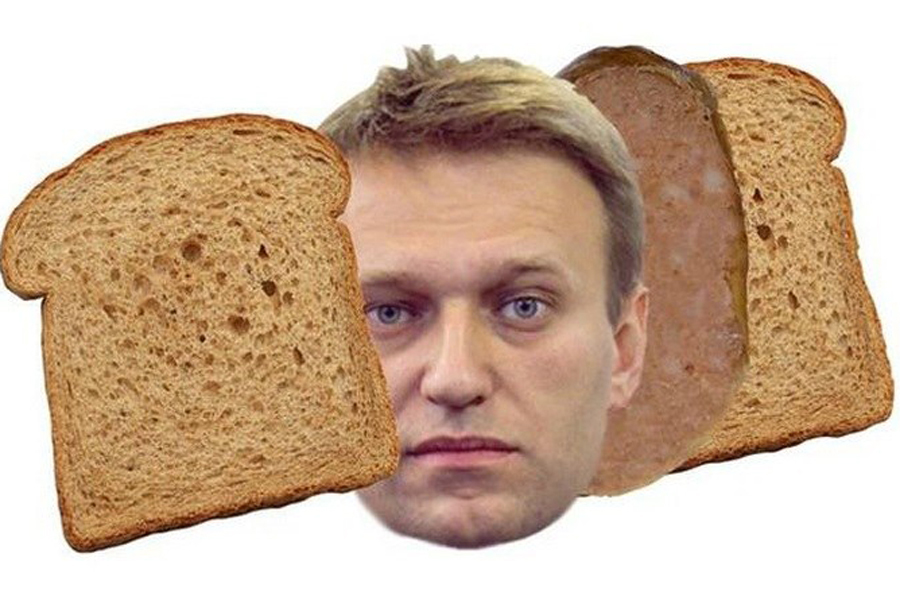
Let’s summarise all of this “sandwich” farce. Although part of Navalny’s team learned to pronounce the words “Crimea is Ukrainian” in 2022, they only do so in reference to the norms of international law. This, of course, is better than nothing. However, Navalny’s allies do not address the issue of compensation and repentance, even to the Crimean Tatars, who Russia has been repressing since the 18th century. Even if self-proclaimed Russian “opposition” members contemplate this, they do not openly discuss what will happen to Russians who illegally seized Ukrainian property in the occupied territories and what mechanisms will be in place to compensate Ukraine. They do still make it clear, though, that a “rent [for the Black Sea Fleet]” still “irritates” them.
Navalny’s poisoning and imprisonment
In August 2020, Russian security services carried out an assassination attempt on Navalny by poisoning him with the nerve agent Novichok. After recovering from the attack, Navalny was arrested with fraud and money laundering charges. The European Court of Human Rights later recognised the charges against Navalny and his arrest as unlawful. He is sentenced to serve the next nine years in a maximum-security prison. Canadian filmmaker Daniel Roher made a documentary about the investigation into Navalny’s case, and it won the Oscar for Best Documentary Feature in 2023.
This may look like a typical case of an activist whose activities are a nuisance to the government, but it’s not that simple. Careful observers have long noticed how skilfully Navalny has created an information bubble around him that encourages people to heroise and empathise with him. Even the Oscar win came about through a game of Hollywood trickery, notes Azad Safarov, the second director and line producer of the Ukrainian film House of Splinters, which was nominated for the same award.
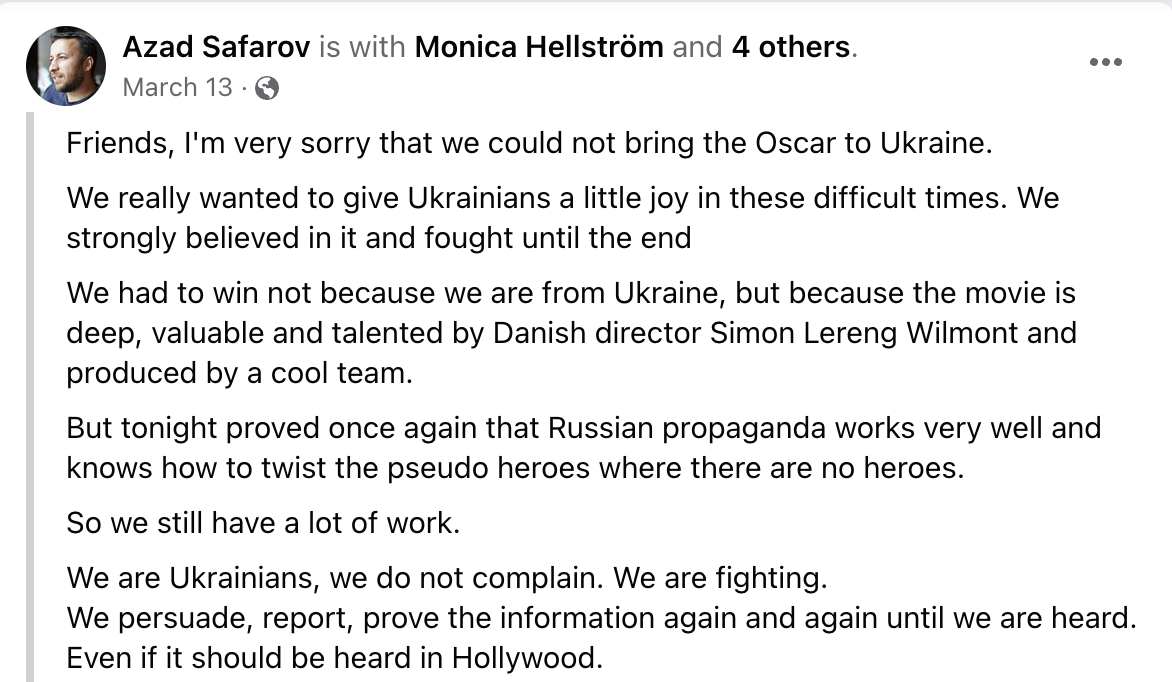
Navalny and his team after Russia’s full-scale invasion of Ukraine
Members of Navalny’s team distance themselves from other Russian “opposition” groups, openly declaring their refusal to cooperate with them. After Russia began its full-scale invasion, Navalny’s associates stated they would work primarily on the “informational front” as opposed to the political field. They cover the details of Navalny’s imprisonment and advocate for his release, only sometimes reporting on Russia’s war in Ukraine.
Analysing the Russian opposition’s takes on Ukraine and ending the war
As noted, to end the war, Russia must cease hostilities and withdraw its troops beyond Ukraine’s 1991 borders. However, there are more conditions necessary for achieving lasting peace. We decided to examine how Navalny’s team envisions Russia’s exit from the war.
To analyse their takes on ending the war, we have used a strategy developed by Ukrainian intellectuals and activists. This manifesto is a specific action plan to restore justice for Ukraine, establish robust guarantees of Russia’s non-interference in Ukraine’s internal politics, and prevent future aggression. We selected the 12 Navalny team accounts with the most followers on Twitter, a key channel for communication with their supporters and potential future voters. The list included two collective team accounts and ten personal accounts.
Editor's note
Twitter is now called "X", but we're using the platform terminology that was in place over the study period.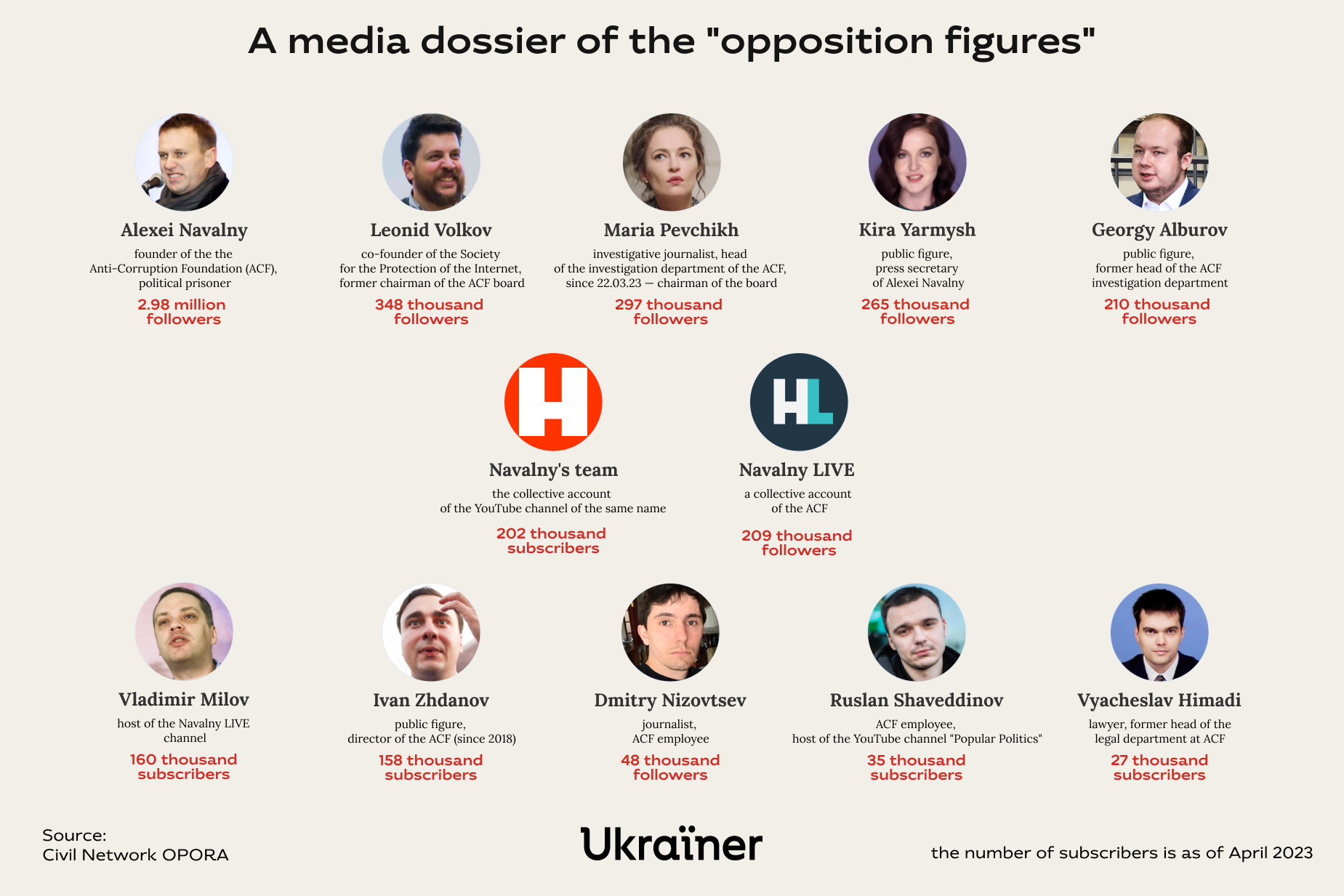
A media dossier of the "opposition figures"
We analysed all the tweets posted by the so-called oppositionists between February 24, 2022 and February 7, 2023. The data was collected by web scraping the selected Twitter accounts to automatically create a database of the users’ tweets. The final list included only their tweets, their responses to other users’ tweets, and their comments on shared articles, videos, or other external content.
We focused on messages mentioning strategies for Russia’s exit from the war and grouped all relevant tweets into the following nine topics:
– Sanctions as a tool for political change and a way of limiting Russia’s ability to wage further war
– Russians’ collective responsibility for the war in Ukraine and their views on a policy of repentance after Ukraine’s victory
– Trial of Russian war criminals
– Withdrawal of the Russian Federation from the temporarily occupied territories of Ukraine (not only the military but also the political elite)
– The need for negotiations between Ukraine and Russia and how the team’s vision of peace aligns with the demands outlined by Ukraine in President Volodymyr Zelenskyy’s “peace formula”
– Support for supplying weapons to Ukraine or, conversely, calls to stop supplying weapons (to understand whether representatives of Navalny’s team wish for Ukraine’s victory and the de-occupation of all territories or believe that Ukraine should engage in peaceful negotiations and relinquish some of its territories)
– Return of forcibly deported Ukrainian children
– The payment of reparations to Ukraine after the war, including amounts of compensation, sources of funding, calculation, and payment mechanisms
– A vision of Russia’s future, such as potential border changes, civil war, internal reforms, etc.
We only looked at written content from team members that made it into the selection of tweets. The dataset didn’t include any interviews, podcasts, live broadcasts, YouTube videos, etc. by those politicians.
Throughout almost a year of the full-scale invasion, representatives of Navalny’s team (including Navalny himself) published 2,577 tweets regarding Russia’s exit strategy from the war. However, this topic represents only about 10% of the team’s total tweets over the selected period.
Leonid Volkov most actively posted about this topic with 664 tweets. In second and third places are the collective “Navalny’s Team” and “Navalny LIVE” accounts — 278 and 208 tweets, respectively. Ivan Zhdanov (195 tweets) and Kira Yarmysh (177 tweets) rank second and third among the personal “oppositionist” accounts. Vyacheslav Gimadi (71 tweets) and Dmytro Nizovtsev (22 tweets) tweeted the least about Russia’s withdrawal from its full-scale war in Ukraine.
slideshow
It is also worth noting that since around September 2022, Navalny’s team has been increasingly less vocal about all topics related to Russia exiting the war. For example, in April-May 2022, these “oppositionists” mentioned sanctions 340 times. Then, from December 2022 to January 2023, there were less than 70 mentions. We see the same trend with other topics: they wrote the most about Russians’ collective responsibility in March 2022 (143 tweets), while in January 2023, this topic was mentioned only 24 times. Presumably, the importance of ending Russia’s war in Ukraine and ways to achieve this are no longer at the forefront of the “oppositionists’” minds.
Sanctions against Russia and Russians
Over nearly a year of full-scale war, the Navalny team published 1020 tweets about sanctions. Leonid Volkov (232 tweets), Alexei Navalny (105), and Ruslan Shaveddinov (105) wrote the most on this topic. Although this topic is the most popular among Navalny’s supporters, over the course of the year, their interest in it gradually decreased. For example, in the second month of the full-scale war, Navalny’s team members tweeted 176 times calling for sanctions, then in January 2023, they only mentioned sanctions 29 times.
In April 2022, they created the 6000 List (or the “List of bribe-takers and warmongers”), which includes Russian officials, media figures, and oligarchs involved in the theft of Russian property and the fuelling of Russia’s war against Ukraine. Since then, Navalny’s representatives have been actively advocating for the use of this list as a reference for applying personal sanctions, all the while never interacting with the Ukrainian side. In March 2023, ACF Chairman Leonid Volkov was forced to resign after writing a letter to the EU calling for the lifting of sanctions on Russian oligarch Mikhail Fridman and three of his business partners.
In February 2023, Alexei Navalny’s team published a text on their social media titled 15 Points from a Russian Citizen Who Wishes Well for Their Country (“15 Points”). It summarises their vision of Russia’s exit strategy from the war. In 15 Points, the team mentions sanctions only once, saying that after the overthrow of Putin’s regime, sanctions on Russia’s oil and gas industries should be lifted and a portion of the profits directed to Ukraine as reparations.
At the same time, the West hardly approves of such an approach to sanctions. The primary purpose of imposing sanctions against Russia is to disrupt its military and economic capabilities, making the war increasingly costly and less advantageous for Russia’s top political and military leadership. The West’s sanctions policy is also aimed at depriving top Russian officials — who bear responsibility, directly or indirectly, for the war and war crimes committed on Ukrainian territory — of their resources (money, assets, yachts, etc.).
Sanctions also contribute to the “awakening” of Russian society, which continues to support the aggressive war and agrees to mobilisation measures within Russia. Suppose sanctions were lifted and Russia again became a welcomed player in the international community: it would quickly regain its capabilities and have the potential to once again wage aggressive wars against its neighbours and violate fundamental principles of international law. Even if Alexei Navalny’s team came to power and had no intention of repeating its predecessors’ mistakes and starting a new war, there are no guarantees that the subsequent political leadership of Russia would share the same commitment.
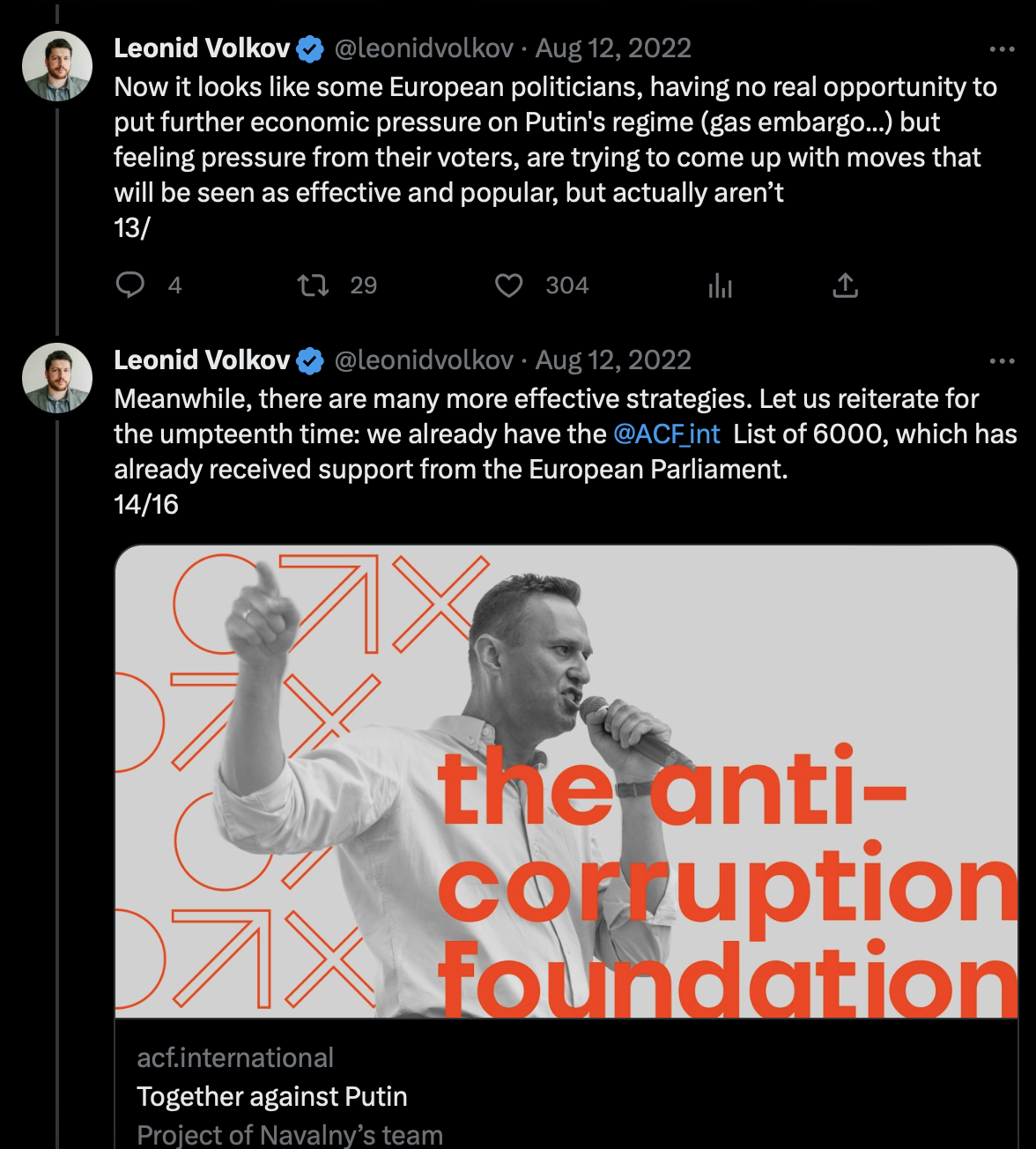
Screenshot from Leonid Volkov’s Twitter
On their Twitter accounts, Navalny’s allies have focused on promoting their 6000 List (as of April 2023, it contains the names of nearly 7000 individuals implicated in corruption in Russia and war crimes in Ukraine). Navalny’s team regularly informs its readers about which Russian oligarchs, politicians, or public figures they have added to the List and which are sanctioned. The accounts of these so-called opposition figures feature hundreds of tweets with investigations into Russian officials who support the war, revealing their hidden assets and their children’s international educations. They also highlight how already sanctioned Russians, such as propagandists Margarita Simonyan, Vladimir Solovyov, and Kateryna Andreeva, bypass these restrictions. However, the 6000 List is still incomplete. While it features the most prominent members of the Russian elite, political establishment, and military, the perpetrators of war crimes often escape inclusion.
Representatives of Navalny’s team have also tried to explain their vision of sanctions policy. In their view, personal sanctions (which the 6000 List supports) are meant to “make [supporting] Putin toxic.” They say that all current and future individuals on the list who support Putin and the war in Ukraine should not only lose all their assets outside Russia, but also be collectively prevented from leaving the country.
However, they want individuals from this list to have a choice: 1) continue supporting Putin and remain under sanctions or 2) be removed from the sanctions list provided they “resign from their position, publicly condemn Putin and the war, and disclose everything they know.” Navalny’s associates do not indicate whether such an approach would completely bleach someone’s reputation. For example, if Margarita Simonyan were to come out with a statement condemning Putin, would she be forgiven and exempted from sanctions despite her apparent involvement in war crimes in Ukraine? The list also ignores the fact that a significant number of Putin’s associates are active in Russia’s war in Ukraine and responsible for war crimes. Making a public statement in exchange for an economic incentive would contradict Ukrainians’ uncompromising right to justice.
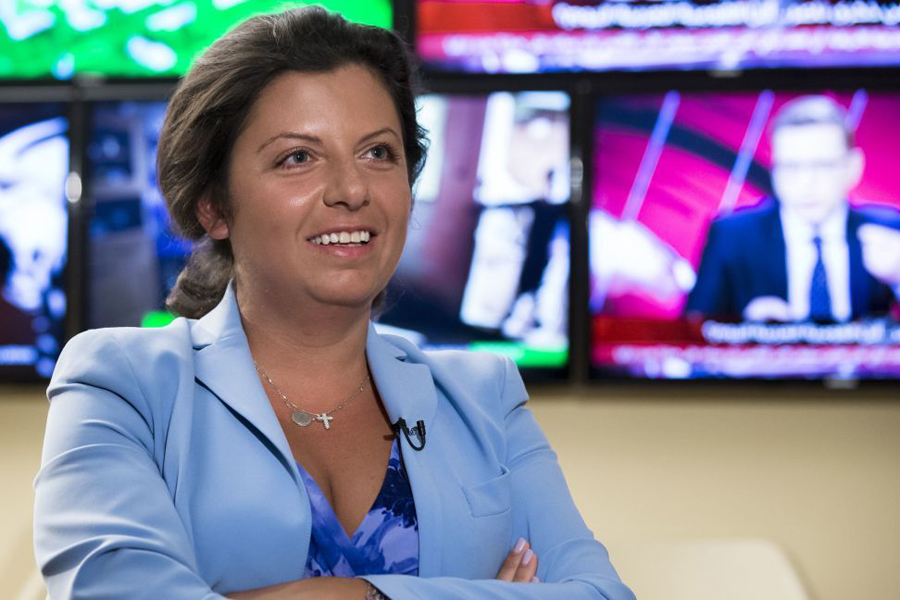
Margarita Simonyan Photo: Associated Press.
Regarding the imposition of sanctions against Russia in general, these “opposition figures” say “it’s not that simple.” Navalny’s team tries to prove to Russians that the Western sanctions are effective and will affect everyone. They regularly write that the sanctions are painful and that all attempts by the Russian authorities to develop domestic production will fail, eventually leading to situations like that of the airline Aeroflot, where aeroplanes are being dismantled. While attempts to scare Russians with warnings of the highest prices since 1999 can be effective, Navalny’s team combines them with another interpretation of sanctions that differs from the global definition. According to Vyacheslav Gimadi, “the ACF [advocates] for sanctions not based on a passport or place of birth but on specific corrupt connections with the Putin regime.”
Navalny’s associates keep pushing the fight against corruption in Russia as their main priority. However, this fight only intends to increase the efficiency of the state apparatus in Russia. The only people who would benefit from cleaning up the Russian government are its citizens, whose silent consent enables Russia’s war. The Navalny team’s sanctions list aims to cleanse the Russian authorities for the benefit of Russians; it does not intend to end the war in Ukraine.
Navalny supporters also argue that the strategy of economic sanctions is flawed because it affects “20% of the anti-Putin electorate: people who travel to Europe, send money abroad, and own property.” As for other segments of the population, such restrictions are ineffective because these people “haven’t lived well, won’t start now, and won’t begin anew.” The “opposition figures” also reject the policy of banning Russians from entering the EU, arguing that “visa bans harm those people who are useful in the fight against Putin” since they “divert anti-war Russians away from the democratic West” and “make them suffer.” Leonid Volkov writes that Western attempts to compel Russians to overthrow their totalitarian regime through economic pressure and travel restrictions will only make them “pillars of the regime.” The fact is, though, that Russians have had many opportunities to leave Russia (and many have already left), and we still do not see mass movements of Russians against the war, neither inside their country nor abroad.
Navalny’s team also criticises the ban on access to European resources and educational programmes for Russians, saying this is their only opportunity to travel abroad. In their tweets, Navalny’s associates also express their misunderstanding of the decisions of some EU countries to ban the Dozhd TV channel, as it allegedly tells the truth about the war in Ukraine. At the end of December 2022, Dozhd was banned in Lithuania and Latvia for showing a map of Russia that included Crimea and for promoting fundraising efforts to support the Russian army. Navalny supporters also criticise the blocking of RIA Novosti in the EU, saying that the media outlet should be blocked in Russia first. However, it is still unclear how the EU can and should ban RIA Novosti from broadcasting in Russia, as it can only act within its own jurisdiction.
The team also vigorously denounces any sanctions that make life difficult for Russian emigrants. Leonid Volkov, for example, was indignant that he did not know “a single Putinist whom the decision of Visa and Mastercard would have harmed, but it dealt a huge blow to many people who do not support Putin, as well as to independent media.” However, these restrictions are unlikely to affect Russian expats who left Russia before the full-scale invasion. Instead, they mainly impact Russians who left during the war and continue to use Russian banks, thus financing the war.
Editor's note
In March 2022, Visa and Mastercard announced they were completely stopping all transactions and operations in Russia.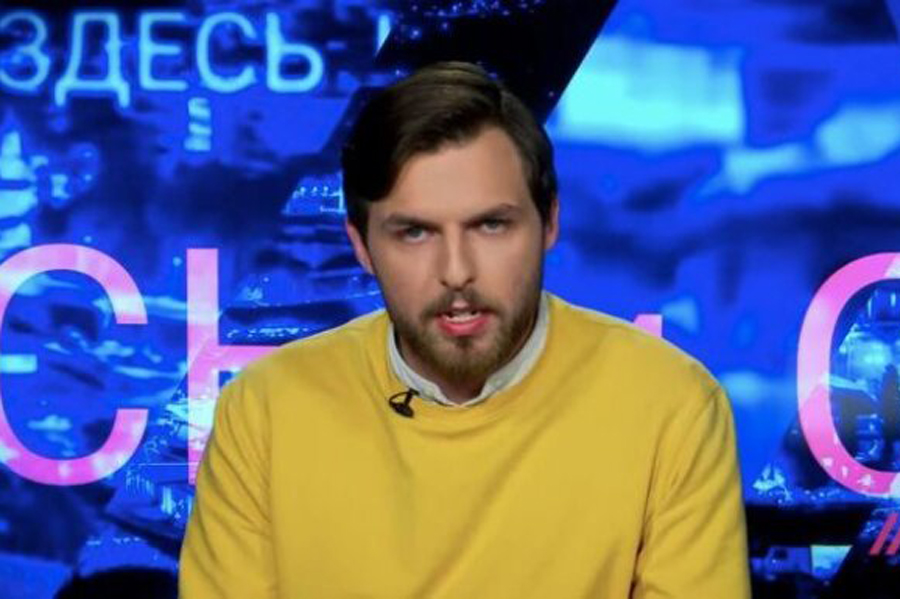
Aleksey Korostylev on air on the “Dozhd” TV channel (screenshot from video).
The collective responsibility of Russians
The concept of collective Russian responsibility for the war in Ukraine is sometimes misunderstood by Western audiences. After all, we cannot condemn all 144 million Russian citizens, imprison them, and force them to atone for their actions against the Ukrainian people. However, we should not confuse collective responsibility with collective guilt. Guilt can only be proven in court in relation to a specific person who committed a specific crime. The issue of collective responsibility that Ukrainians talk about has a slightly different meaning. Russians’ collective responsibility lies at the level of morality. It implies that Russian society should feel responsible for how it has harmed another group of people. For example, it is still quite common for Russian companies, businesses, and even individuals to remain silent in response to all the crimes the Russian government and army have committed throughout the war in Ukraine. This silence allows the Russian authorities to act unhindered and continue their policy of war against Ukraine. All of these war crimes make up part of the collective responsibility of Russian society, which did not rebel against the war and ignored the invasion of a neighbouring country. Collective responsibility implies repentance and is a direct bridge to further atonement, including the payment of reparations.
Over the monitoring period of this study, Navalny’s associates published 704 tweets about Russians’ collective responsibility. Leonid Volkov (232 tweets), the Team Navalny Twitter account (125 tweets), and Ivan Zhdanov (76 tweets) were the most active. In the data-coding process, the researchers marked any references such as “Putin’s war” as related to (a lack of) collective responsibility, as such wording absolves Russians of involvement in the full-scale war and blurs their responsibility, whether direct or indirect, for the consequences of a war that has been going on for over nine years. For example, in November 2022, Leonid Volkov tweeted that after Putin announced general mobilisation, “support for Putin’s crimes in Russian society [started] falling.” Volkov makes it seem as though Putin himself was setting up torture chambers and raping and shooting civilians in Ukraine. Yes, it is Putin himself who “bombs cities and kills innocent people,” as Kira Yarmysh tweeted, disregarding the long chain of military and government officials involved in these crimes. Maria Pevchikh was surprised that “not a single [Russian] minister, deputy or even official has resigned because of the war.” “Everyone supports the war? How else can this be interpreted?” she asked her Twitter followers.
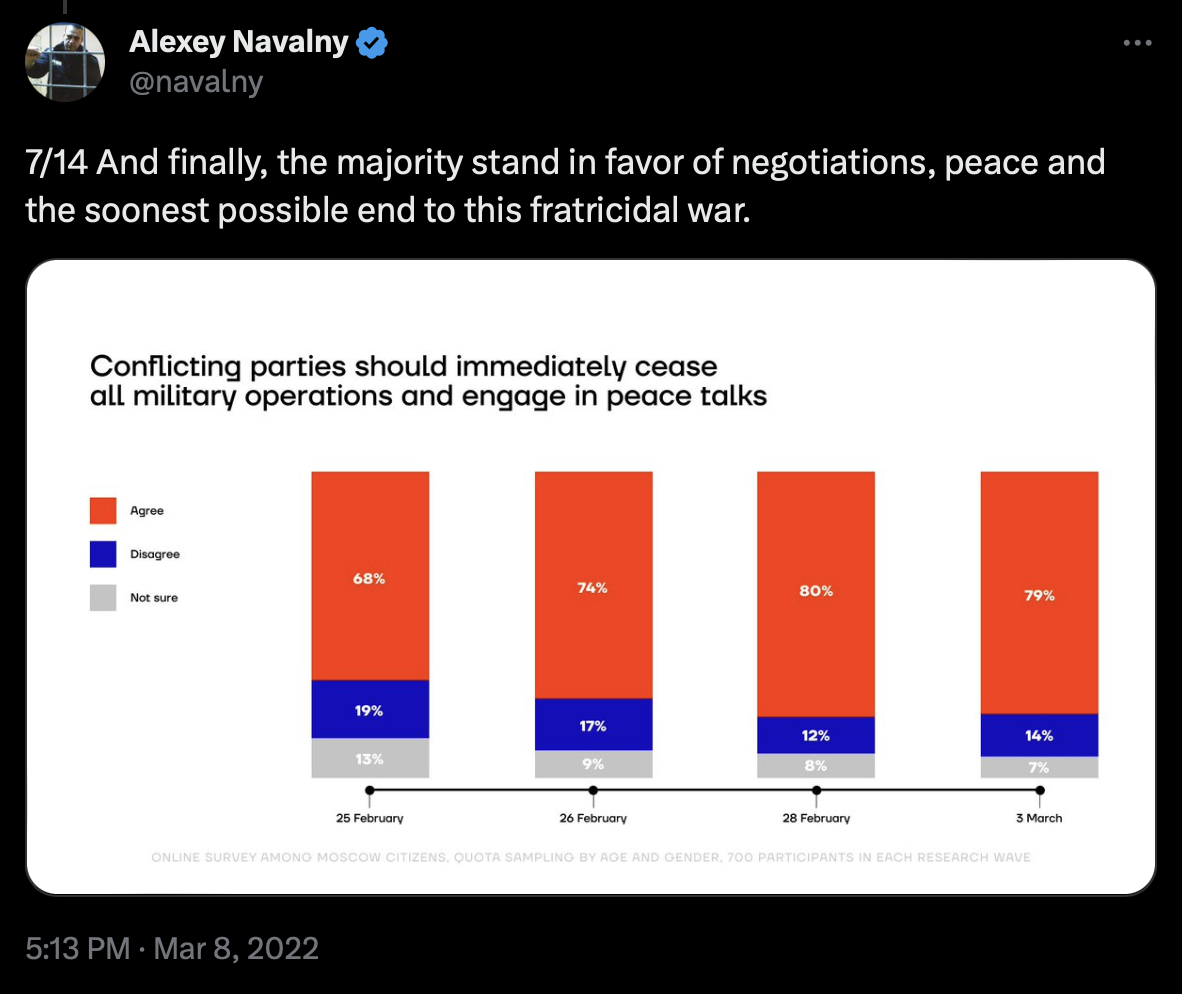
Alexei Navalny’s tweet with the results of a survey of 700 Moscow residents. Navalny interprets responses that both sides in the war should lay down their arms (i.e., Ukraine as well)as proof of low support for the war among Russians.
Navalny’s associates have been actively advocating that Russians do not support Putin and that any sociological research under authoritarian rule is irrelevant. In a tweet, Vladimir Milov even explicitly called people idiots for sharing data indicating that almost two-thirds of Russians supported the war in Ukraine. He argued that this only “divides people” and hinders the fight against Putin. At the same time, the Navalnyists promote their own regularly conducted opinion polls, which they acknowledge are unrepresentative but which still supposedly reflect the “real” level of Russian support for the war in Ukraine.
Members of Navalny’s team note that they used to conduct polls according to scientific standards. However, after the start of the full-scale invasion, they had to abandon the representativeness of their surveys, as fewer and fewer Russians wanted to talk about the war in Ukraine. (This silence is also a sign of Russians’ unconcerned attitudes towards collective responsibility for crimes in Ukraine.) The Navalny team’s samples therefore only reflect the opinions of Moscow residents who are active Internet users. Then, when they receive results that only 7% of respondents consider it necessary to allocate more funds to the Russian army (like they did in their June 2022 poll), Navalny’s team interprets this as an indicator of how few Russians support the war.
Data on support for the war
A sociological survey by the All-Russian Public Opinion Research Centre held in August 2022.A survey that only samples 700 residents of Moscow is clearly an attempt to manipulate a quantitative indicator to reinforce their opinion.
Similarly, “opposition” figures disseminate data that an increasing number of Russian citizens are beginning to view their country as an aggressor rather than a peacekeeper and are accusing it of being responsible for the war. In fact, only 36% of Russians consider Russia to be the aggressor, while the rest blame the collective West, Ukraine, or “both sides.”
The lack of representativeness in the Navalny team’s research becomes even clearer when one considers that it does not include any residents of other regions of Russia, only several hundred of a capital of 12 million people. Navalny’s team is aware of these limitations. It emphasises that when conducting these surveys, its primary interest lies in tracking how the responses change over different periods, even among a small sample size.
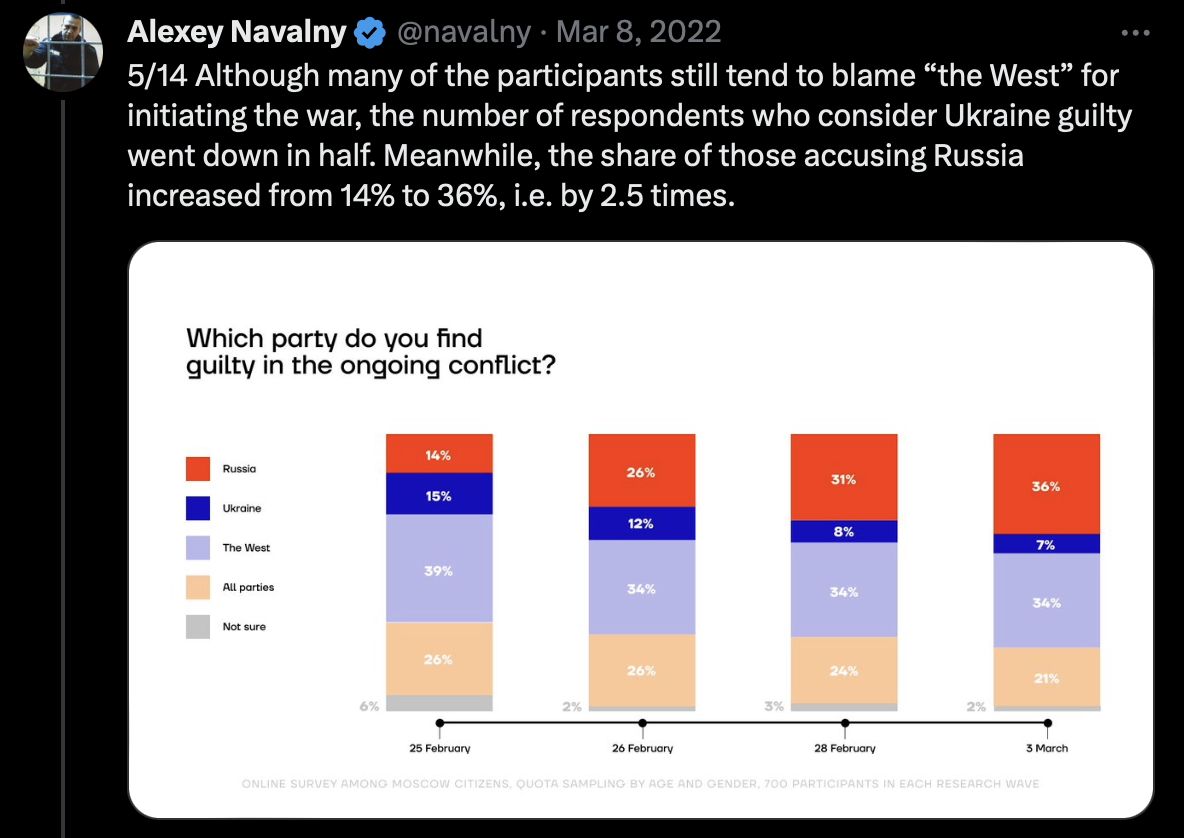
The results of a survey of 700 residents of Moscow, where only 36% consider Russia to be the aggressor as of March 2022.
Navalny supporters take great offence when Russians are labelled as “slaves” and “incapable of democracy,” considering these expressions to be “pro-Putin,” “immoral,” and “untrue.” But who will tell them that this must be proven through successful examples or at least systematic attempts rather than just Twitter posts? A representative of Navalny’s team, Georgy Alburov, expressed his surprise, saying that if Russians have “slave genes,” then why haven’t the 3 million Ukrainians without these “slave genes” who live in Russia already overthrown the regime? And while Navalny’s associates sometimes agree that Russians should bear collective responsibility, they usually put a comma after this statement, not a period. For instance, in his Twitter posts, Vladimir Milov justifies himself by saying, “While Russia and Russians are to blame, some people go too far” and “I did everything to stop Putin, and I refuse to share this responsibility.” His colleague Vyacheslav Gimadi considers collective responsibility to be like “Putin’s rule-making madness.”
At the same time, in an article for The Washington Post, Navalny notes that “Putin started and is, of course, leading the war against Ukraine, […] but the real party to the war is the entire elite and the system of power itself, representing an endless self-replicating Russian authoritarianism of imperial nature.” According to the logic of these so-called Russian opposition figures, “ordinary people” have no blame or responsibility. It is specifically Putin who is responsible for the fact that “people in Ukraine [who] should be sleeping in warm homes […] instead sleep in the metro.”
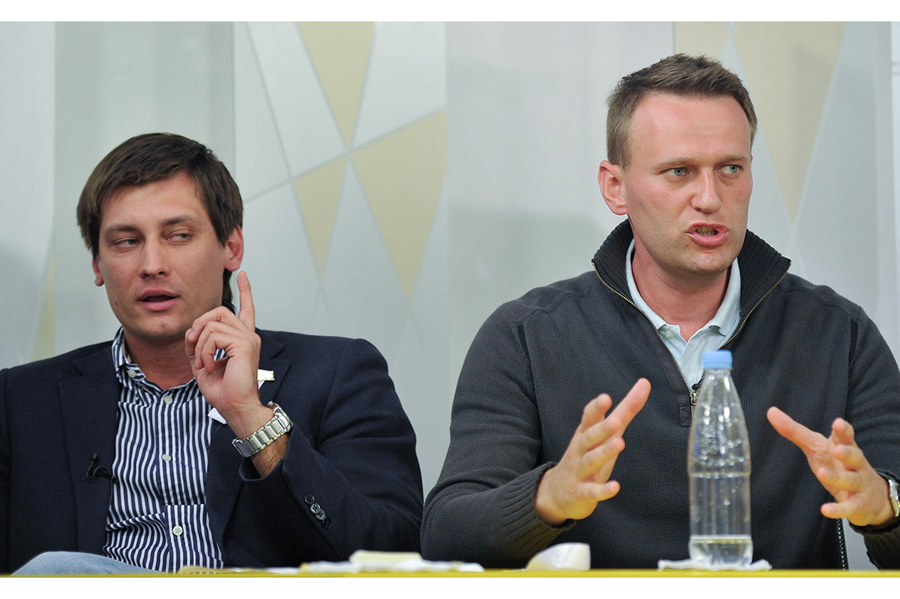
Alexei Navalny giving a speech. Photo taken from open sources
The trial of Russian war criminals
The third most popular topic among Navalny’s team is the trial and punishment of war criminals. In this category, the Opora researchers included any references to the criminality of Russia’s war against Ukraine, the actions of the Russian authorities, and the definition of Putin and his entourage as terrorists. The representatives published 354 tweets on this topic throughout the observation period. Leonid Volkov (90 tweets), the Navalny LIVE account (47 tweets), and Maria Pevchikh (40 tweets) mentioned the war crimes tribunal the most.
In his 15 Points, Navalny mentions that the new Russian authorities should “investigate war crimes in cooperation with international institutions” after the full-scale war. However, neither Ukraine nor the international community will agree with this method. The issue of war crimes should be considered under international law and not at the discretion of the aggressor country. The investigation of war crimes committed by the Russian army in Ukraine has been going on for a long time, and some war criminals are already serving their sentences. In the spring, the International Criminal Court issued arrest warrants for Putin and Maria Lvova-Belova, Russia’s Presidential Commissioner for Children’s Rights, for their involvement in the illegal deportation of Ukrainian children. So, the opposition’s views on this issue appear detached from reality.
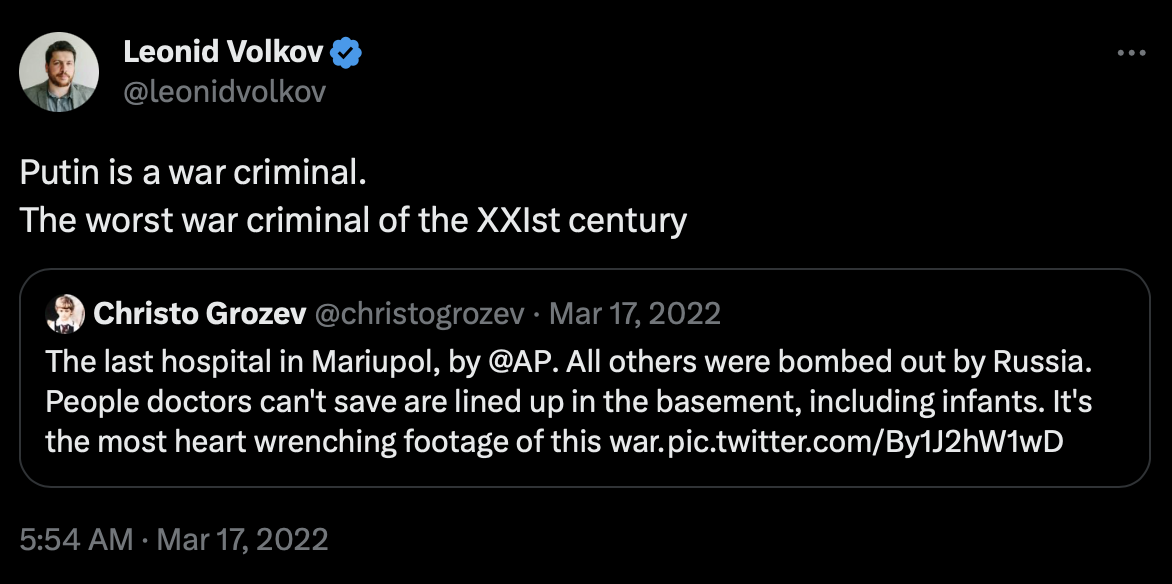
Screenshots from Leonid Volkov’s Twitter account
Navalny’s associates generally agree with his views on this topic. Most of his colleagues have tweeted that the actions of certain Russians constitute war crimes and have called for establishing an international tribunal or transferring Putin to The Hague. Interestingly, Navalny’s team often covers war crimes committed by the Russian army on the territory of Ukraine. For example, they informed their followers about the atrocities committed in Bucha and surrounding regions, calling these events a genocide of the Ukrainian people. Leonid Volkov tweeted that the trial of war criminals is the only way for Russia to move away from the ideology of Putinism: “if Putin dies now, before defeat, before the court, before exposure, then Putinism as an ideology will survive.” The “oppositionists” think that many people would think the Russians “could have won if they hadn’t killed the leader” and that “there was order and stability under Putin.” According to Volkov, it is better for Russia if “Putin is defeated, and he sees the collapse of his regime” because he should “not remain a legend in the memory of his supporters” but rather be recognised for what he truly is – a “pitiful, cowardly, greedy madman.”
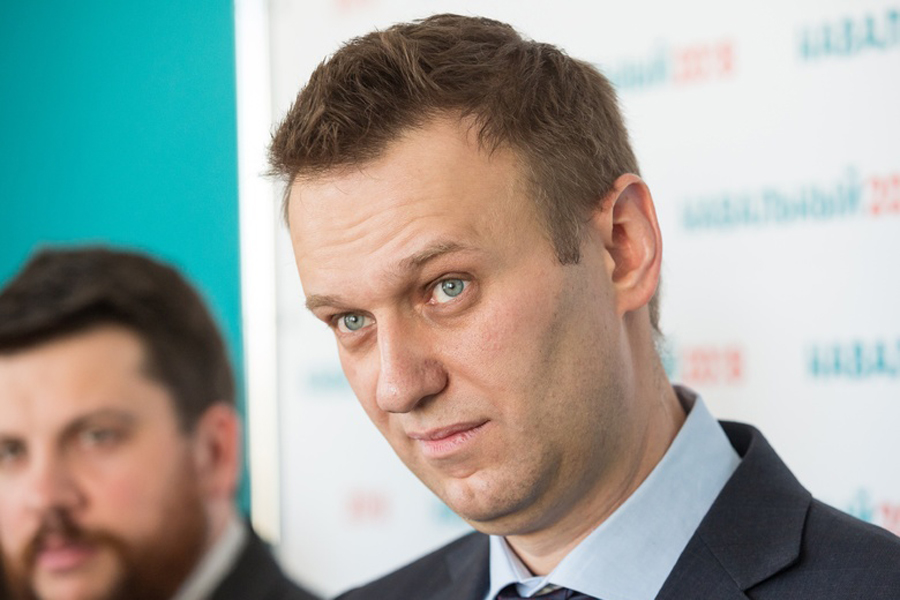
Alexei Navalny giving a speech. Photo taken from open sources
However, when browsing through Navalny supporters’ tweets about war crimes, it is challenging to understand who they consider guilty of committing them. Some of their posts do claim that members of the Russian army are the criminals and occupiers because they “participate in a criminal war” and, therefore, “to serve in the army means to be an accomplice to war crimes.” For example, the Navalny LIVE account wrote, “Russian soldiers should defend Russia and be in barracks. All those now on the territory of a foreign state that did not attack us are participating in a serious war crime.” Another “oppositionist,” Vladimir Milov, called for forgetting about the “great Russian culture” and coming to terms with the fact that “for years to come, the image of Russia will be the atrocities committed by Russian soldiers in Bucha.” But Kira Yarmysh tweeted that the killings in Bucha and the massive missile attacks on civilian infrastructure were Putin’s fault and that “he cannot be excused for this.” And Navalny called the mobilisation “an attempt to draw people into the crimes committed by Putin.”
Navalny’s team also calls Russian propagandists war criminals because they “create such public opinion that not only allows Putin to commit war crimes but also demands them.” For example, Maria Pevchikh mentioned the arrest of Félicien Kabuga, the CEO of the Rwandan media outlet Radio Télévision Libre des Mille Collines (RTLM), who was suspected of sponsoring the 1994 Rwandan genocide, and hinted that Margarita Simonyan would be his successor. At the same time, her tweets support the controversial propagandist Marina Ovsyannikova, who stated that “only one person is responsible for the aggression – Vladimir Putin.”
Genocide in Rwanda (East Africa)
In 1994, representatives of the Hutu people, who made up the ethnic majority in Rwanda, organised massacres of the Tutsi people. According to UN estimates, more than a million people died. RTLMC worked as a source of propaganda, inciting hatred and violence and dehumanising the Tutsis.Although Ovsyannikova was almost a symbol of Russian resistance for some time, she has been working for Russian propaganda since the beginning of the Russo-Ukrainian war in 2014. Even if her change in position is sincere, it does not relieve her of responsibility for whitewashing Russian crimes for eight years.
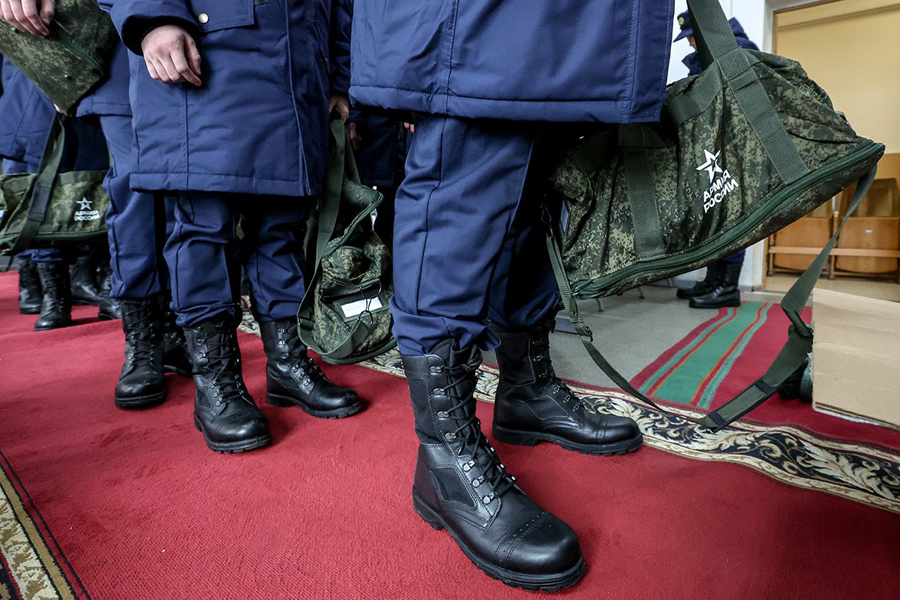
Legs of Russian war criminals. Photo taken from open sources
Navalny’s team also lacks a clear vision of how the trial of Russian war criminals should take place. For example, Vladimir Milov welcomed the actions of the European Parliament, which, in January 2023, adopted a resolution in support of establishing a tribunal. Ruslan Shaveddinov, commenting on the verdicts in the MH17 case (the downing of a Boeing 777 near Donetsk on 17 July 2014), wrote that further cases should also be heard in The Hague. The Navalny LIVE channel tweeted that Russian war criminals should be convicted either by a Ukrainian court or a court in The Hague, and Georgy Alburov wrote that the Russian elite (Putin, Shoigu, Kadyrov, etc.) would be tried by an international tribunal after an independent Russian court. However, Navalny’s team does not specify how, under their leadership, Russia would commit to extraditing war criminals to an international court.
As of September 2023, Russia still has the right to veto in the UN Security Council, allowing it to block decisions on the jurisdiction of the International Criminal Court in Ukraine’s case against Russia. Therefore, the statements made by Navalny’s team are, for now, nothing more than populist tweets.
The return of the occupied territories of Ukraine
Over the year of observation, the so-called opposition published 175 tweets that mentioned the temporarily occupied territories of Ukraine. Leonid Volkov tweeted the most about this topic (59 times), while all the other “oppositionist” accounts posted about it between 11 and 17 times throughout the year. In general, Navalny’s associates agree that Ukraine should return all its territories and restore its 1991 borders.
All of their references to the occupied territories are either news content or statements about the criminal occupation and the need to return these territories to Ukraine. Sometimes, the “oppositionists” even manipulate this topic to justify their inability to overthrow their dictatorial regime. Vladimir Milov, for example, responded to criticism of the sluggishness of protest movements in Russia by saying, “When the residents of the occupied territories of Ukraine overthrow the occupiers, then you can show us a master class on how to do it correctly.” He also suggests to Ukrainians that they don’t understand the “real situation of terror in Russia,” which they could try to comprehend by looking at the situation in the occupied territories. It is highly doubtful that Vladimir Milov has witnessed a tank anywhere other than Moscow’s Victory Park or heard artillery shelling in real life.
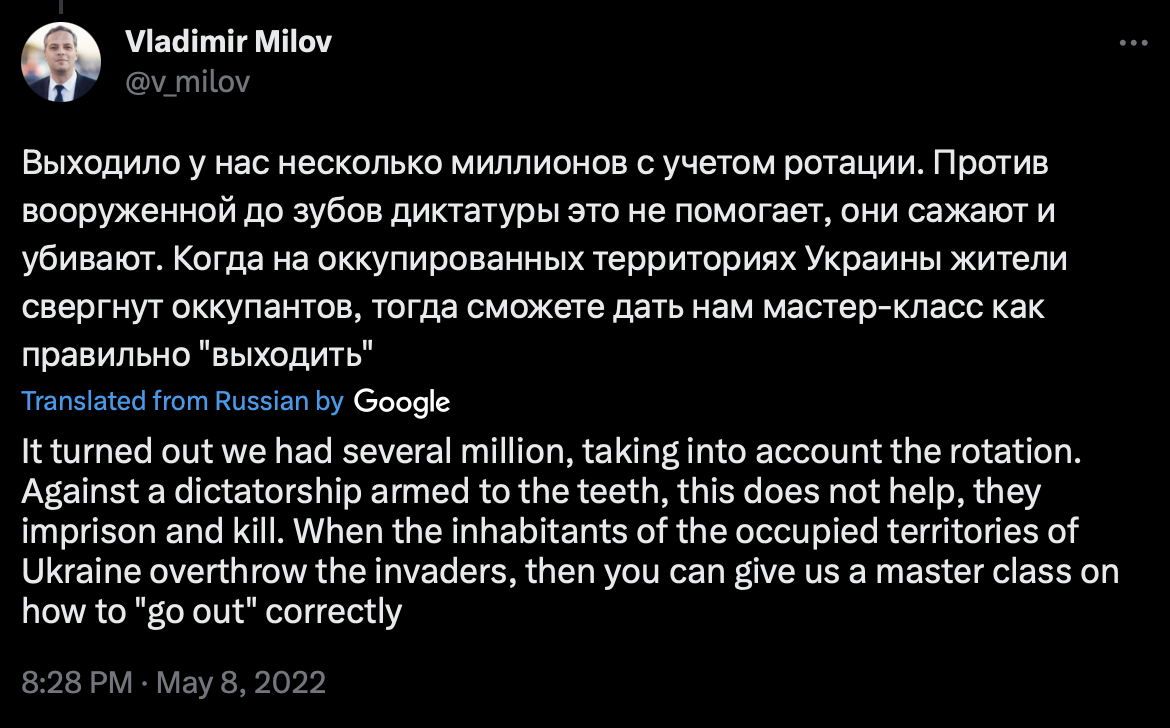
From Navalny team representative Vladimir Milov. He states that "when the residents of the occupied territories of Ukraine overthrow the occupiers, then you [Ukrainians] will show us [Russians] a master class on how to 'get out' correctly."
Negotiations between Russia and Ukraine
The selected accounts tweeted about negotiations between Russia and Ukraine 98 times, with 75 of these tweets written by Leonid Volkov. Navalny supporters consider negotiations impossible as long as the parties are at war, and they view Russian diplomats as “hooligans” and “gangsters.”
It is also clear to them that negotiations would benefit only Russia. Any ceasefire agreements are dangerous because they would not mean a final resolution to the war but a frozen conflict, which would only benefit Russia and “tired Europe” which, according to Volkov, would prefer a “bad peace instead of a good war.” However, European countries continue to support Ukraine. It is wrong to unequivocally argue that Europe only tacitly waits for the end of Russia’s war. In addition, almost the entire international democratic community unanimously agrees with Ukraine’s peace formula (support for it was announced, in particular, in the European Union, PACE, and the UN).
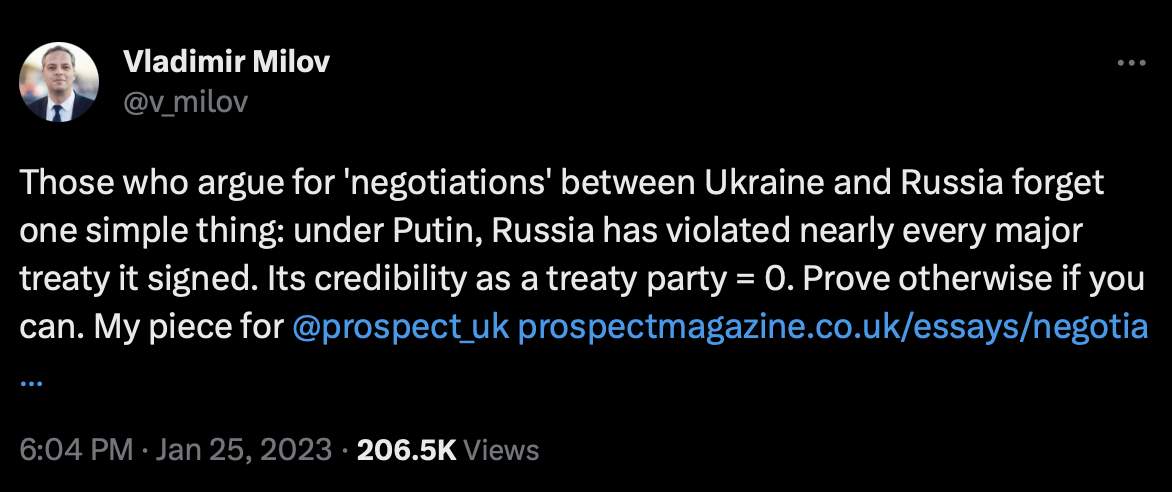
A Navalny team representative tweeted that under Putin’s leadership, Russia has violated all the international agreements it has signed. Needless to say, Russia also violated such agreements during the USSR and Yeltsin’s leadership.
The supply of weapons to Ukraine
During the study period there were only 50 tweets on this topic, 20 of which were published by Volkov. Navalny supporters generally support the supply of weapons to Ukraine and emphasise that a full-scale war would not have occurred if Ukraine had been given weapons earlier. However, in a 2015 interview with The Washington Post, Alexei Navalny stressed that Western countries should not transfer lethal weapons to Ukraine because “Ukraine’s military victory over Russia is impossible.” He also compared the price of a Javelin to the amount of online advertising that would lead to “at least 8 million views of a video with the truth about what is happening in Ukraine.” However, Russians simply need to read the news in international or Ukrainian media. Furthermore, the Russian army’s advances cannot be stopped by online advertisements.
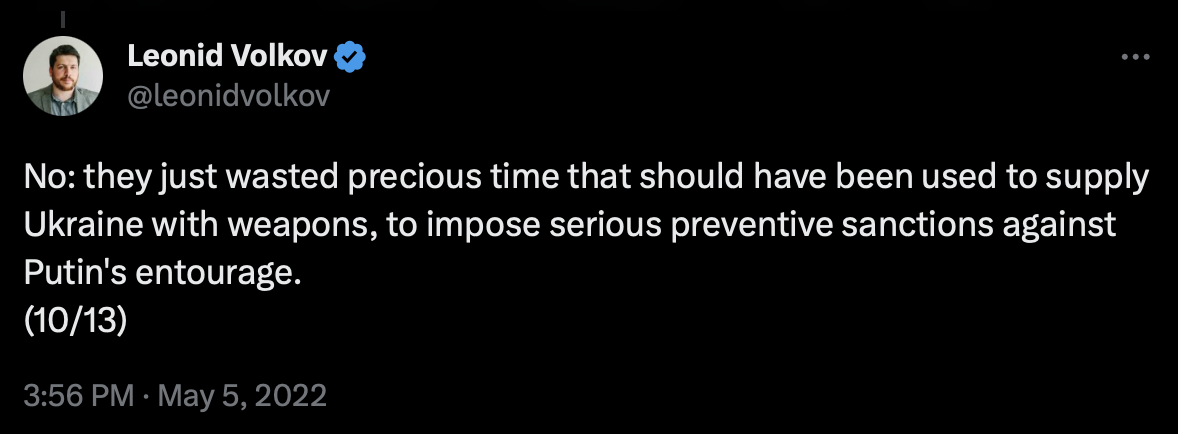
Screenshots from Leonid Volkov’s Twitter
Russian “oppositionists” generally report on new arms supplies to Ukraine, rejoicing at the delivery of tanks and calling for the provision of air defence systems. But Leonid Volkov and Ivan Zhdanov, in particular, have written that Western countries should not respond to the Kremlin’s nuclear threats by supplying Ukraine with tanks or aircraft, saying that this is just weapons sabotage. Although Navalny’s team does seem to prefer arms deliveries to Ukraine to negotiations, their advocacy campaign for arms to Ukraine has remained at the level of a few tweets yearly.

A tweet by Alexei Navalny
Russian “oppositionists” also mention foreign campaigns to raise funds for Bayraktars and other weapons for Ukraine, admire the “solidarity and self-organisation” of Lithuanians, and complain that “Russia has never had a crowdfunding campaign even remotely similar in scale.” However, when asked about the possibility of organising a similar campaign in Russia, Leonid Volkov replied that donating to the Armed Forces of Ukraine from Russia is too dangerous, so Navalny’s team will not be doing such collections. At the same time, while the Russian “oppositionists” actively advocate for the rights of Russians living safely abroad, the researchers did not find any calls for Russian emigrants to donate to Ukraine’s victory.
The return of deported Ukrainian children and payment of reparations to Ukraine
Throughout the year, Navalny’s associates only published 12 tweets about Ukrainian children deported by Russia, most of which were news articles. They (predictably) do not mention that this is a sign of genocide, nor do they talk about mechanisms to help or return forcibly deported children.
The least-discussed topic among the Navalny supporters was the concept that after the end of Russia’s war against Ukraine, Russia would be compelled to pay reparations to Ukraine and to every Ukrainian who lost property due to their unprovoked aggression. There were only three tweets on this topic: two published by Leonid Volkov (in March and August 2022) and one from the Navalny LIVE account (in March 2022). All three tweets say that after the end of the war, “in addition to shaming Russians, for which Putin is personally responsible,” Russia will pay Ukraine “hundreds of billions in reparations.” According to Volkov, ordinary Russians should not bear the burden of compensation because “Putin’s friends would have stolen more anyway, and it is their arrested assets that should be used for payment.” In only three tweets, Russian “oppositionists” try to sell the idea that paying reparations would cause “incredible moral and material harm” for Russians.
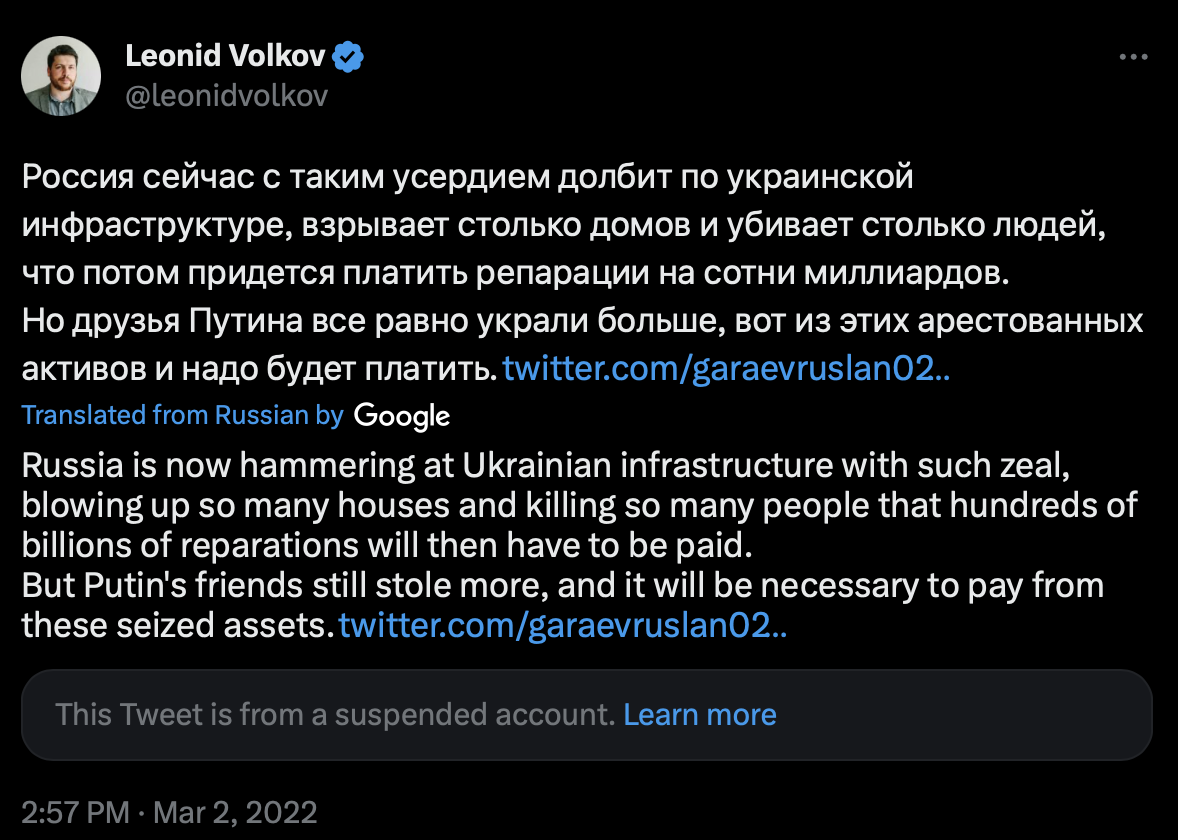
Leonid Volkov on reparations
Vision for the future of Russia
The Navalny team only published 163 tweets about its vision for the future of Russia over the study period, putting this topic in fifth place. Leonid Volkov (97 tweets, almost 60% of the total), Ivan Zhdanov (19 tweets), and Kira Yarmysh (17 tweets) wrote the most about the future of the Russian Federation.
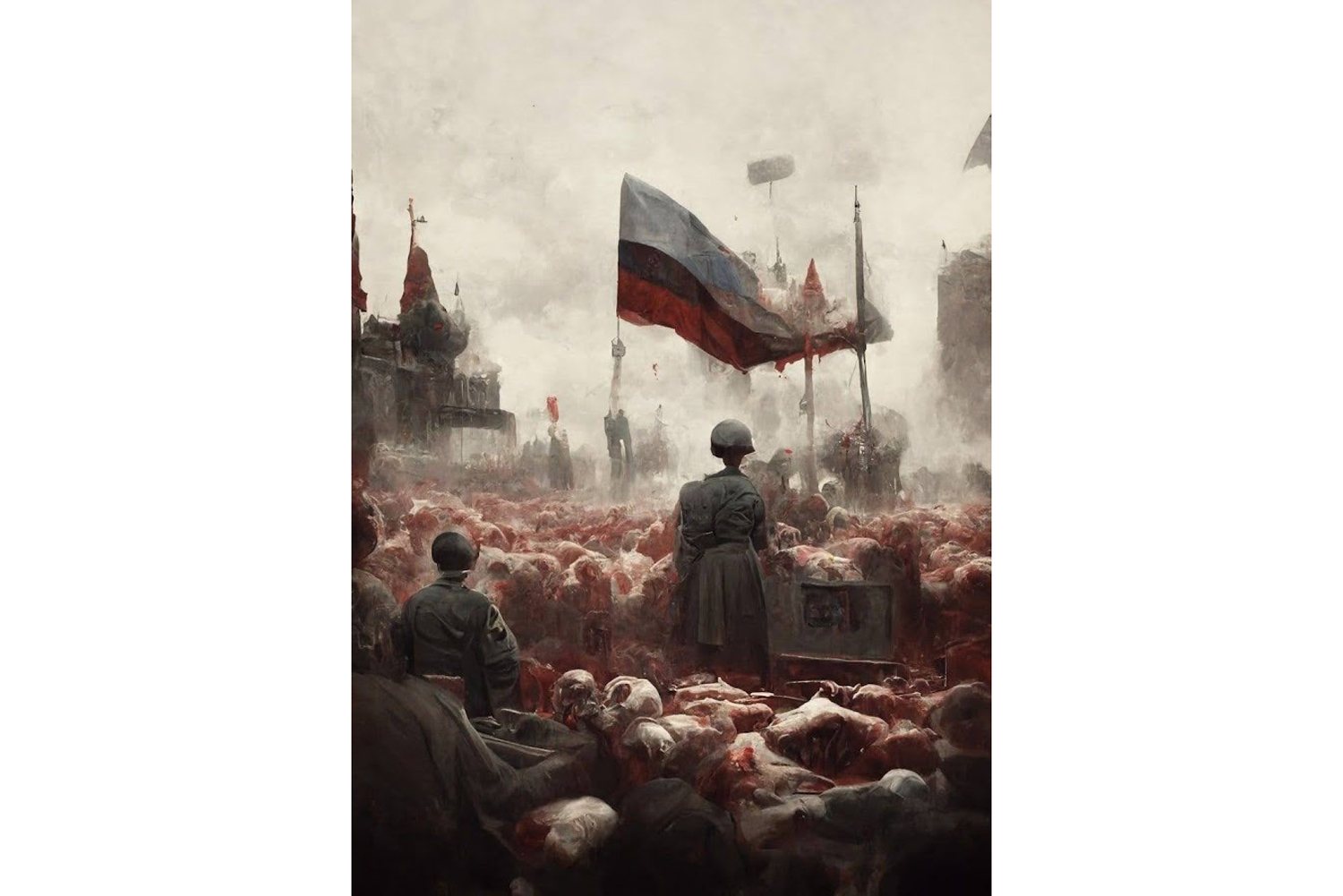
The future of Russia. Illustration: DALL-E-2 artificial intelligence.
In 2022, Navalny’s team posted links to two major articles about their vision for Russia on their collective social media accounts: Navalny’s 15 Points text and his article in The Washington Post. Both present a relatively clear image of the “Beautiful Russia of the future,” as Navalny’s associates call it. They believe that after the war, Western countries and the new Russian government should aim to ensure that Russia and its leadership “do not want to start wars and do not find them attractive.”
According to Navalny, Russian society in itself is not prone to aggression — it’s just a small caste of imperial-minded Russians who are. He also adds that to prevent aggressive imperialists from returning to power, Russia needs to take control away from the hands of one person, transition to a parliamentary republic, and create a system where the dominant principles are “consent, agreement, and consideration of the interests of the entire society.” Power variability should be established “through honest elections, independent courts, federalism, and local self-government.” “Putin’s regime and dictatorship” should be dismantled, “ideally through general free elections and the convening of Constitutional Assemblies.”
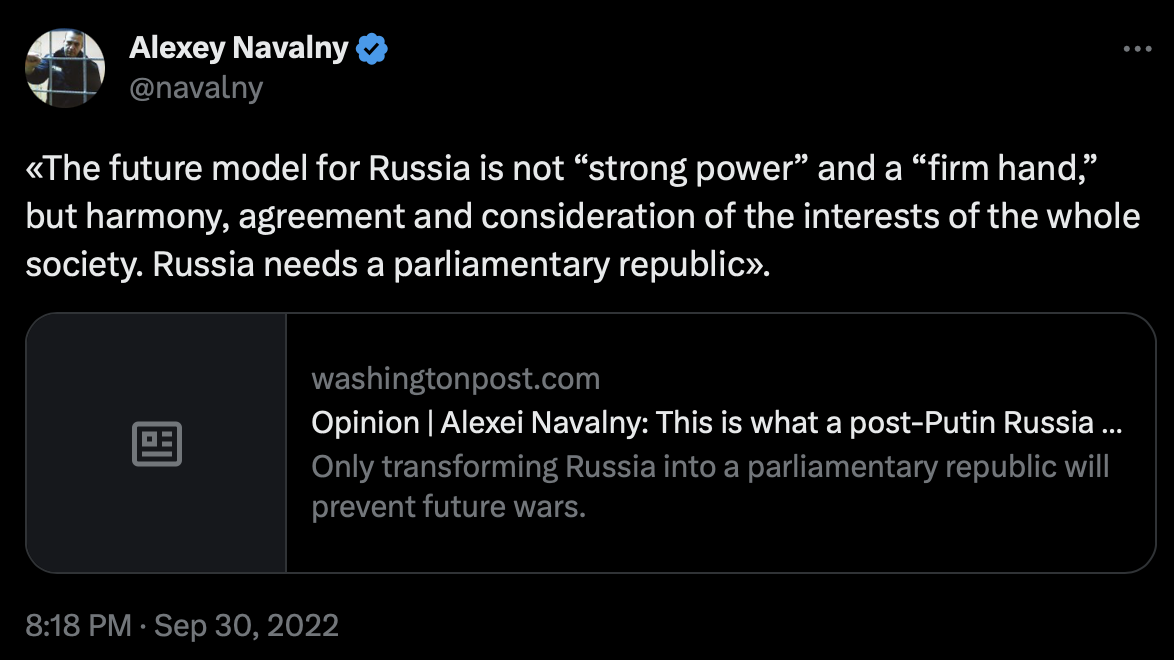
Navalny on the future of Russia as a parliamentary republic
Navalny’s associates elaborate on this topic on Twitter. They write a lot about how Russia’s future lies in Europe. For example, Leonid Volkov, quoting MEP Andrius Kubilius, tweeted that “it is impossible to change the democratic genetics of Russian citizens” and that Russia itself would “return to the Council of Europe, PACE, and the ECHR” after its war in Ukraine is over, because “countries should trade and cooperate, not fight.” But Volkov later shared the same interview with Kubilius and asked readers to pay attention to the paragraph about the Marshall Plan, which says that the West will need to create a roadmap for recovery for Russia so that it does not start another war due to economic problems.
Such calls indicate that Navalny’s supporters do not really understand the essence of the Marshall Plan, which aimed to restore the European countries affected by World War II, not to prevent World War III or support the opposition forces in Germany. Or does the Russian “opposition” agree that Russia should be bombed, occupied, and divided into “West” and “East” in order to receive desired grants from the West?
Marshall Plan
The programme of economic aid to European states after World War II, proposed by U.S. Secretary of State George C. Marshall in 1947 (it began in April 1948), is commonly referred to as the "Marshall Plan."Navalny’s supporters also make predictions about Russia’s fate after the war. Ruslan Shaveddinov tweeted that about 16 million Russians live below the poverty line, that this figure will only increase because of the war, and that you can’t democratically change the government in Russia. Ivan Zhdanov wrote that the arrival of war on Russian territory is inevitable and that a collapse of the Russian Federation is quite realistic. Leonid Volkov, on the other hand, is convinced that “the collapse of Russia into several parts that will fight each other and have nuclear weapons” is impossible, and that such apocalyptic forecasts primarily benefit the Kremlin itself. According to him, it is essential to convince Europe and America that nothing bad will happen after the fall of the Putin regime.
So, how oppositional are these Russian “oppositionists”?
Overall, the Twitter activity of the Navalny team representatives included in this study resembled that of a media outlet more than a political group (which, just a few years ago, was considered almost the sole alternative to Putin’s regime). The newsroom-level activities of one of the most institutionalised Russian “opposition” groups, which was considered almost the sole alternative to Putin’s regime just a few years ago, is evidence of its political infantilism. The Navalny team regularly complains about critics, including Ukrainians, who do not understand their “hard fate” and do not appreciate their efforts to achieve peace and democracy in Russia. For example, Vladimir Milov, commenting on criticism from a Ukrainian Twitter user, wrote the following: “You are looking for double and triple interpretations where there are none. Stop it. I explain to everyone that ‘Ukrainians are not Nazis, they are normal, Putin is lying’ — but here Ukrainians come in the comments, and the work becomes challenging.” Navalny’s supporters even referred to Ukrainian activist and blogger Iryna Gil as a “khokhol” and an “animal” for her criticism of Maria Pevchikh on Twitter.
Apart from its condemnation of Russia’s war against Ukraine as undesirable, the Navalny team’s values and views on many aspects of the war are often contradictory and inconsistent. One might explain this by saying that their primary focus is on releasing their leader from prison, not the war or Ukraine. However, even their few opinions about the future of Russia and Russian-Ukrainian relations raise more questions than answers.
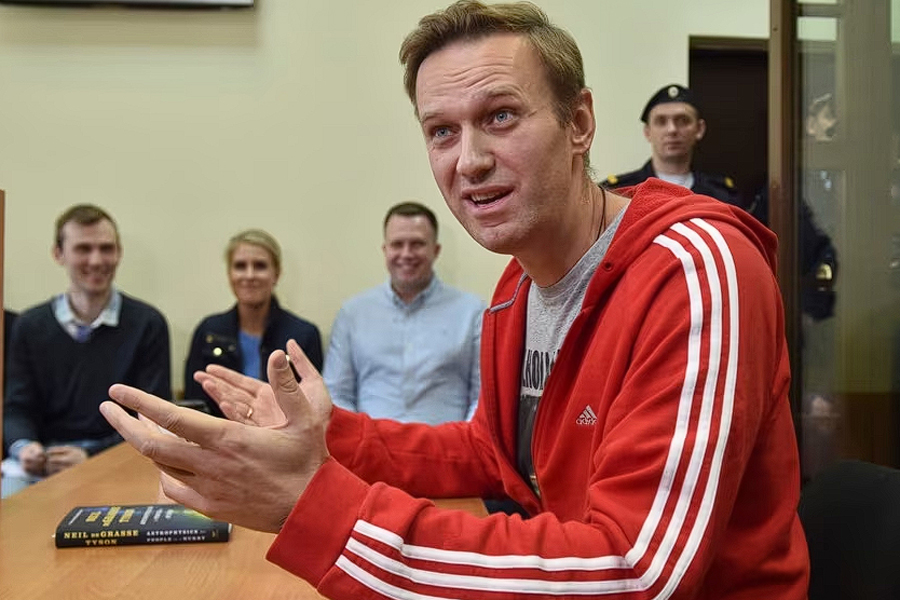
Alexei Navalny during a court session. Photo: AR.
“Opposition figures” are trying to leverage mentions of violence and crimes committed by the Russian army in the occupied territories of Ukraine to highlight the suffering of Russians, including Russian liberals. They are allegedly suffering as much as Ukrainians living under occupation or in the non-front-line territories that Russia regularly shells.
Similarly, Navalny’s supporters use discussions about reparations and the post-war development of Russia to emphasise the necessity of all kinds of support, including financial aid, so that Russia can “bounce back from the bottom” and build capacity for the necessary compensation. This rhetoric certainly appears justificatory and manipulative, as it allows Navalny’s team to seemingly forget that it was Russia itself that started this unprovoked war.
The study results show that there is no reason to believe that members of Navalny’s team have understood either the threat their country poses to the architecture of global peace or what it has already done to Ukraine over several centuries of terror. But these Russian “oppositionists” have already begun to lobby for resources for the post-war reconstruction of Russia — competing with the country they are destroying. The Navalny team’s attempts to advocate for their own current and future interests by taking advantage of the global attention on Russia’s war against Ukraine only come across as weak and chauvinistic.

